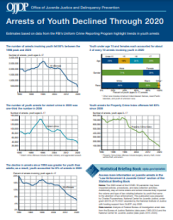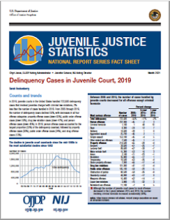Property crime
Arrests of Youth Declined Through 2020
Project on Human Development in Chicago Neighborhoods
Controlling Street-level Drug Trafficking: Evidence From Oakland and Birmingham
Residential Burglary: A Comparison of the United States, Canada and England and Wales
Stopping Credit Card Thieves
National Institute of Justice Annual Report 2007
Exclusion of Illegal Police Evidence in Croatia
Relations Between Criminal Investigation Strategy and Police Management
Learning from Doing Evaluating the Effectiveness of the Second Chance Act Grant Program
Reauthorized in 2018, the Second Chance Act (SCA) aims to reduce recidivism and improve outcomes for people returning from state and federal prisons, local jails, and juvenile facilities through the provision of federal grants. During this panel, National Institute of Justice-funded researchers will detail two ongoing evaluations of the SCA grant program:
- An evaluation of the effectiveness of the SCA grant program per Title V of the First Step Act.
- A longitudinal examination of the long-term impacts of the SCA program.
See the YouTube Terms of Service and Google Privacy Policy
Workforce Calculator Project
An Evaluation of Compstat's Effect on Crime: The Fort Worth Experience
From the Car Boot to Booting it up? eBay, Online Counterfeit Crime and the Transformation of the Criminal Marketplace
Delinquency Cases in Juvenile Court, 2019
How Things Burn: Developing Realistic Models of How Materials Combust and Degrade in a Fire
Multilevel Evaluation of Project Safe Neighborhoods
Project Safe Neighborhoods (PSN) is a DOJ-sponsored initiative to reduce violent crime, particularly gun crime, by fostering cooperation by criminal justice agencies and local partners to develop and implement strategic approaches.
See the YouTube Terms of Service and Google Privacy Policy
Rethinking the Benefits of Youth Employment Programs: The Heterogeneous Effects of Summer Jobs
Was the pope to blame? Statistical powerlessness and the predictive policing of micro-scale randomized control trials
The Philadelphia predictive policing experiment
Examining Equity in State Victim Compensation Programs: A Multilevel Analysis
NIJ Funded Research on Firearms Violence in Urban Cities: Advancing Scientific Evidence to Inform Practice
Identity Theft Supplement (Bureau of Justice Statistics)
Administered to persons age 16 or older who completed an in-person National Crime Victimization Survey (NCVS) interview, the Identity Theft Supplement (ITS) asks respondents if they had experienced identity theft during the past 12 months. The ITS encompasses several types of identity theft, such as the misuse of an existing account, misuse of personal information to open a new account, and other misuses of personal information.
Female Reentry and Gender-Responsive Programming: Recommendations for Policy and Practice
Overcoming School Safety Intervention Implementation Challenges - Breakout Session, NIJ Virtual Conference on School Safety
On February 16-18, 2021, the National Institute of Justice hosted the Virtual Conference on School Safety: Bridging Research to Practice to Safeguard Our Schools. This video includes the following presentations:
See the YouTube Terms of Service and Google Privacy Policy
Physical Safety and Preparedness - Breakout Session, NIJ Virtual Conference on School Safety
On February 16-18, 2021, the National Institute of Justice hosted the Virtual Conference on School Safety: Bridging Research to Practice to Safeguard Our Schools. This video includes the following presentations:
See the YouTube Terms of Service and Google Privacy Policy






